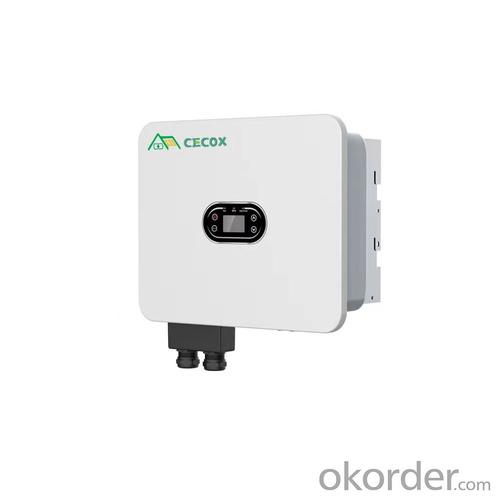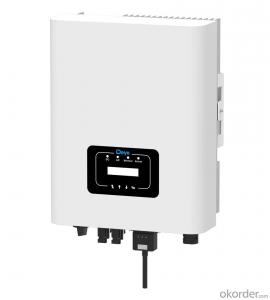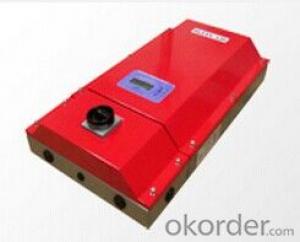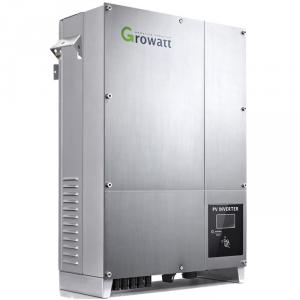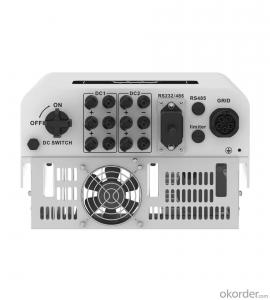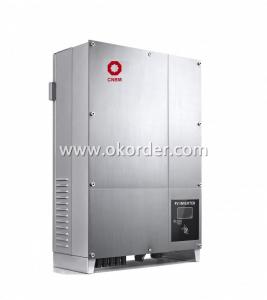Three Phase AC DC Hybrid Solar Inverter 5KVA-12KVA/8-19.2KW
- Loading Port:
- China main port
- Payment Terms:
- TT or LC
- Min Order Qty:
- 1000 unit
- Supply Capability:
- 10000 unit/month
OKorder Service Pledge
OKorder Financial Service
You Might Also Like
Specification
Key Parameters
Output Type:Triple, Pure Sine Wave
Type:DC/AC Inverters
Inverter Efficiency:98.2%
Other attributes
Model Number:XD5KTR, XD6KTR, XD8KTR, XD10KTR, XD12KTR
Input Voltage:160V~800V DC
Output Voltage:230V / 400V AC
Output Current:21.7A~52A
Output Frequency:50Hz / 60Hz
Size:534W*440H*220D mm
Certificate:CE/IEC/ISO/TUV
Warranty:5 years
Weight:30kg
Product Name:DC AC Hybrid Solar Inverter(With Storage)
Battery Type:Lithium/Lead-acid
Rated Power:5000~12000W
Waveform:Pure Sine Wave
Power Factor:0.8 leading~0.8 lagging
Max. PV Input Power:8~19.2kW
Max. PV Input Voltage:1100V
Max. PV Input Current:20A
Communication:RS485 / CAN / WIFI / 4G / LAN / Bluetooth
Packaging and delivery
Package Type:Standard Export Package
Supply Ability:10000 Piece/Pieces per Month
Lead time
Quantity (pieces)1 - 100 101 - 500 501 - 1000 > 1000
Lead time (days) 7 14 21 To be negotiated
Customized packaging
- Q: How does a solar inverter handle voltage sags or swells in the grid?
- A solar inverter handles voltage sags or swells in the grid by constantly monitoring the grid voltage. When it detects a voltage sag (drop below a certain threshold) or swell (increase above a certain threshold), it adjusts its output accordingly. In the case of a sag, the inverter boosts its output voltage to compensate for the drop in grid voltage. Conversely, in the case of a swell, the inverter reduces its output voltage to prevent any damage to connected devices. This ensures that the solar inverter maintains a stable and consistent voltage supply to the connected load, regardless of fluctuations in the grid voltage.
- Q: Can a solar inverter be used with different grid voltages?
- No, a solar inverter cannot be used with different grid voltages. Solar inverters are designed to convert the DC power generated by solar panels into AC power that matches the voltage and frequency of the grid it is connected to. Using a solar inverter with different grid voltages can result in inefficient operation or even damage to the inverter. It is important to ensure that the solar inverter is compatible with the specific grid voltage before installation.
- Q: How does a solar inverter handle voltage drop in long cable runs?
- A solar inverter compensates for voltage drop in long cable runs by using a technology called Maximum Power Point Tracking (MPPT). MPPT allows the inverter to continuously adjust the operating voltage and current to extract the maximum power from the solar panels. This ensures that even with voltage drop in long cable runs, the inverter optimizes the power output from the panels, ultimately minimizing the impact of the voltage drop.
- Q: Can a solar inverter be used with a solar-powered CCTV system?
- Yes, a solar inverter can be used with a solar-powered CCTV system. A solar inverter is responsible for converting the direct current (DC) produced by solar panels into alternating current (AC) that is used to power electrical devices. In the case of a solar-powered CCTV system, the solar panels generate DC electricity, which is then fed into the solar inverter to convert it into AC power, enabling it to operate the CCTV cameras and other necessary equipment.
- Q: Can a solar inverter be used with a ground-mounted solar panel system?
- Yes, a solar inverter can be used with a ground-mounted solar panel system. The solar inverter converts the direct current (DC) generated by the solar panels into alternating current (AC) that can be used to power homes or businesses. Whether the solar panels are mounted on the ground or on a roof, they still require an inverter to convert the electricity into a usable form.
- Q: How does a solar inverter handle reverse power flow?
- A solar inverter handles reverse power flow by automatically detecting the excess power generated by the solar panels and diverting it to the utility grid. This process, known as anti-islanding, ensures a safe and efficient operation of the solar system by preventing overloading and potential damage to the inverter.
- Q: Can a solar inverter be used in areas with unstable grid connections?
- Yes, a solar inverter can be used in areas with unstable grid connections. Solar inverters are designed to convert the DC power generated by solar panels into usable AC power for consumption or to be fed back into the grid. In areas with unstable grid connections, solar inverters can still function and provide power by utilizing battery storage systems or operating in off-grid mode. This allows for uninterrupted power supply and provides stability in areas with unreliable grid connections.
- Q: Can a solar inverter be used in low light conditions?
- Yes, a solar inverter can be used in low light conditions. However, the efficiency of the solar inverter decreases as the amount of available sunlight decreases. Therefore, it may not be as effective in converting solar energy into usable electricity in comparison to bright sunny conditions.
- Q: Can a solar inverter be used with a three-phase electrical system?
- Yes, a solar inverter can be used with a three-phase electrical system. In fact, many solar inverters are specifically designed to work with three-phase systems. They convert the direct current (DC) generated by the solar panels into alternating current (AC) that can be used to power three-phase electrical loads.
- Q: How does a solar inverter handle voltage fluctuations?
- A solar inverter handles voltage fluctuations by constantly monitoring the input voltage from the solar panels and adjusting its output voltage accordingly. It maintains a stable output voltage even when there are fluctuations in the input voltage, ensuring that the electricity generated by the solar panels is suitable for use in the electrical grid or for powering appliances.
Send your message to us
Three Phase AC DC Hybrid Solar Inverter 5KVA-12KVA/8-19.2KW
- Loading Port:
- China main port
- Payment Terms:
- TT or LC
- Min Order Qty:
- 1000 unit
- Supply Capability:
- 10000 unit/month
OKorder Service Pledge
OKorder Financial Service
Similar products
Hot products
Hot Searches
Related keywords




